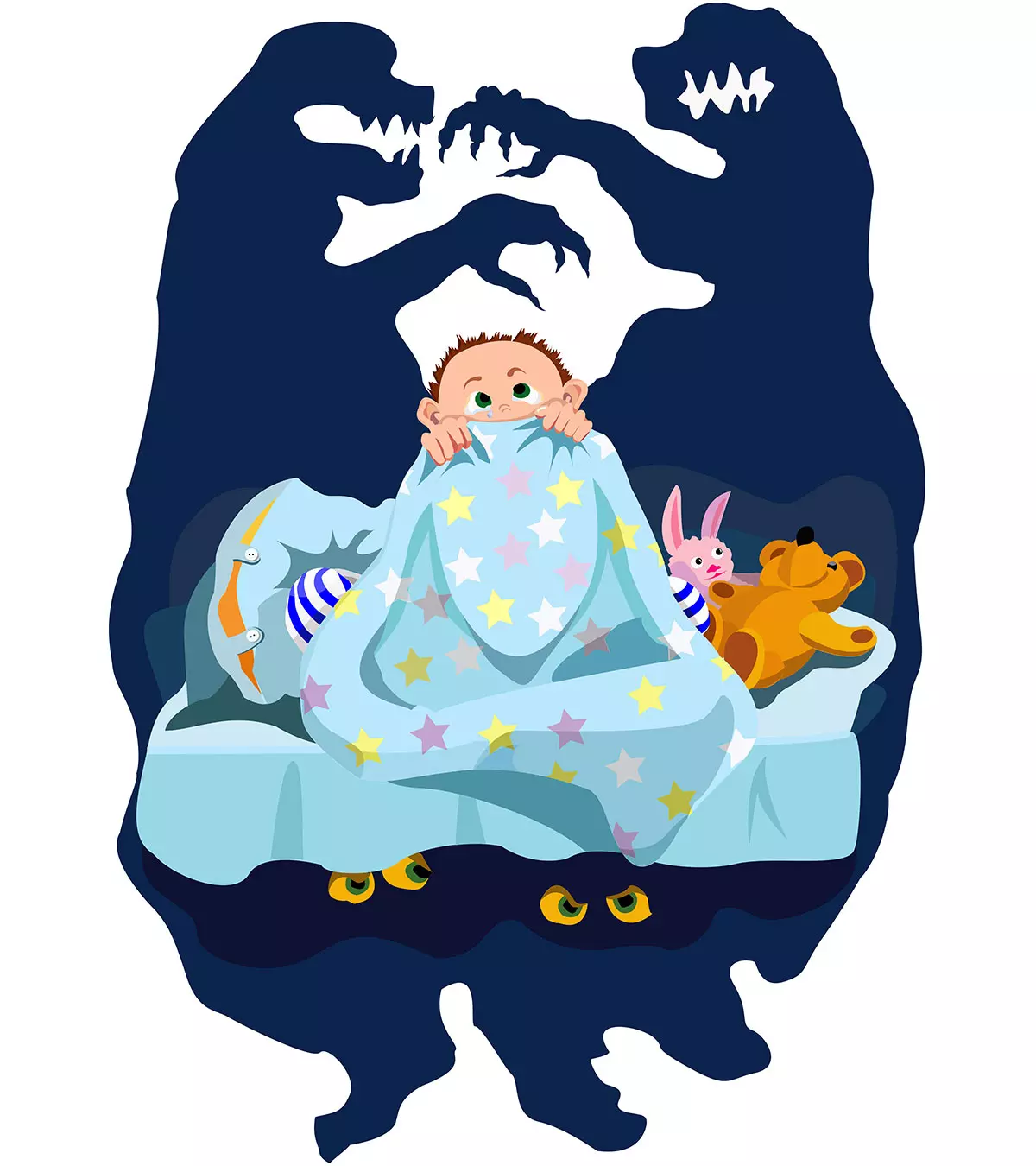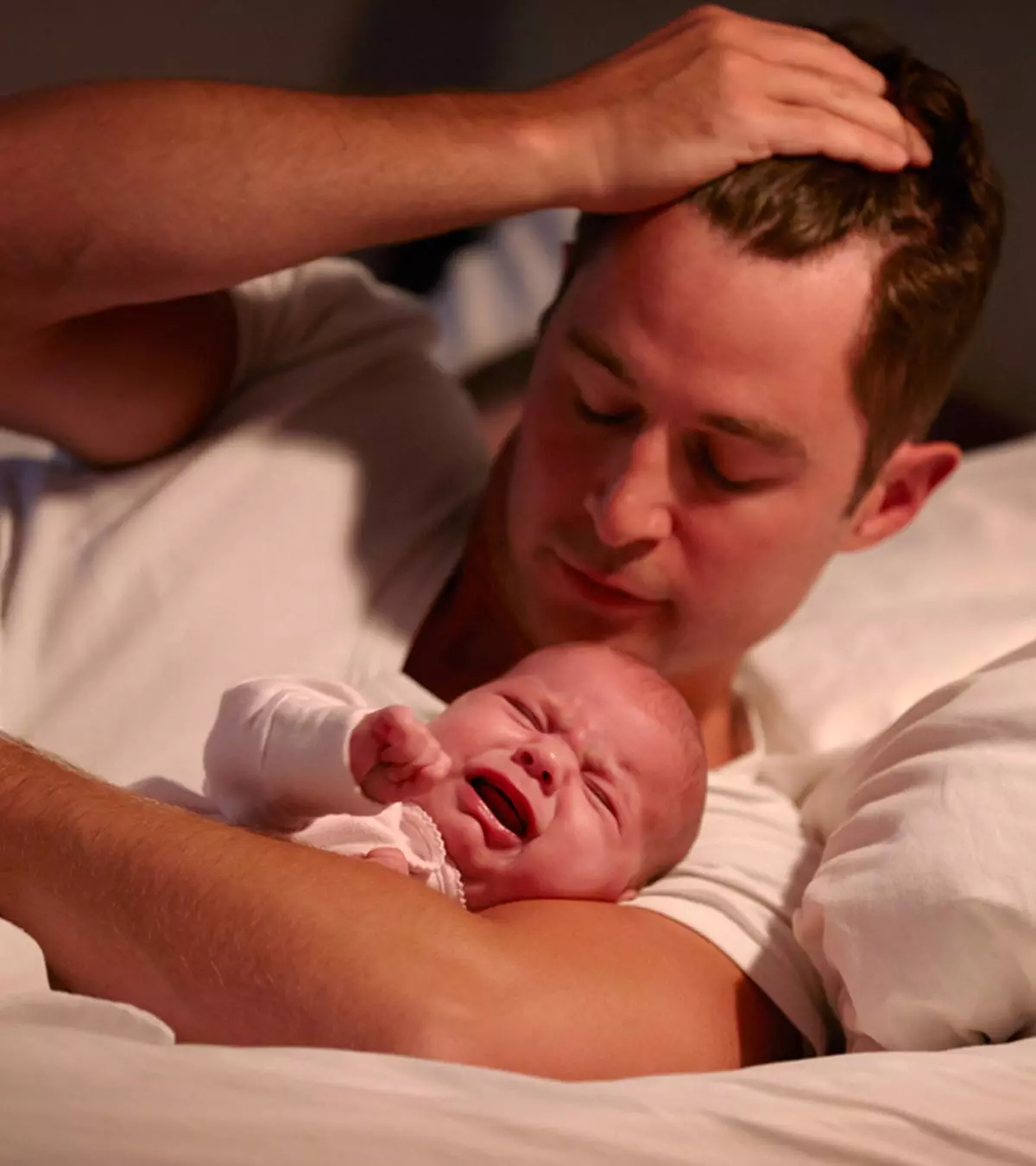
Image: iStock
A baby sleeping a lot may have ongoing growth spurts or developmental leaps. Also, a newborn might sleep more because they get accustomed to life outside the womb. Although managing a newborn’s sleep cycle is challenging in the initial days of life, it becomes easier as they recognize the difference between night and day (1). Sometimes, excessive sleeping can be due to underlying conditions.

Read on to know the amount of sleep needed for babies, how to develop a sleep schedule, and when to seek medical care for a baby sleeping a lot.
Key Pointers
- Babies should get around 12–16 hours of sleep per day until they are around a year old.
- Growth spurts, low blood sugar levels, or ceratin infection/illness may cause the baby to sleep for extended hours.
- Placing the child in the bed and on their back when sleepy and not fully asleep, feeding them well before sleep time, and other tips to help develop a proper sleep schedule are given below.
How Much Should Babies Sleep?
Typically, a baby should get 14 to 17 hours of sleep a day until four months and 12 to 15 hours until one year of age. However, an infant younger than seven months may sleep for up to 19 hours, depending on their need for rest. Nevertheless, since they have small stomachs, they usually wake up every two to three hours to be fed in the first couple of weeks (2).
The following chart displays the total hours of sleep, including naptime, suggested by the American Academy of Sleep Medicine (AASM) for children at different developmental stages (3).

Sleep recommendations for babies and children
Source: Healthy Sleep Habits: How Many Hours Does Your Child Need?; American Academy of Sleep Medicine (AASM)/ American Academy of PediatricsWhy Do Babies Sleep So Much?
Sleeping promotes brain development, neural network building, and behavioral formation, and since infanthood is a period of considerable growth, babies spend most of their time sleeping or slumbering (4).
According to Vaishal Shah, MD, a pediatric sleep specialist at the Cleveland Clinic, “In those early months (since birth), a baby’s brain does not have what we call circadian rhythm, which is the ability to differentiate between night and day. Around three to six months, we start seeing them develop a difference in their nighttime versus daytime sleep patterns (5).”
However, some of the following factors could also cause newborns to sleep a lot:
- Growth spurts: An infant’s brain produces the human growth hormone (HGH) while asleep. Hence, if the baby takes frequent naps in the day and sleeps for longer at night, they may be having a growth spurt (6).

- Illness: Babies who sleep continuously, show signs of drowsiness or sluggishness, such as yawning frequently even after sleeping for hours. If these symptoms are accompanied by a lack of interest in feeding, it could be due to an underlying illness (7).
- Low blood sugar: Listless or lethargic babies who sleep longer, lack energy, and are exhausted could have low blood sugar. They may also be inattentive to sounds or sights when awake and find it difficult to wake up for feedings (7).
- Jaundice: Due to high bilirubin levels during jaundice, babies may become more sleepy, tired, and less interested in eating (8).
- Infection/illness: Babies have lower immunity and are more prone to infections. If the baby has a fever, cough, or skin color changes or sleeps too much and feeds less, they may have contracted an infection (9).
- Insufficient milk: If your baby takes too little or too much time to latch on, they may be getting insufficient milk. This may make them lethargic and cause them to sleep for more than four hours at a stretch (10).

- Vaccination: Vaccinations may cause mild side effects in babies, such as drowsiness and lethargy, which may last for a day or two (11).
 Caution
CautionWhen Should You Wake Your Baby Up For Feeding?
Newborns who regularly sleep for longer than three to four hours should be awakened to be fed. Breastfed babies need to be woken up every two to three hours, whereas bottle-fed babies can sleep comfortably for three to four hours. Ensure the baby is fed at regular intervals until they have gained enough weight, usually a few weeks post-birth. After this, they can sleep for longer intervals at night. (2) The American Academy of Pediatrics recommends waking the newborn up after every four hours of sleep for nursing (12).
What Should You Do If Your Baby Sleeps Too Much?
If you finnd your baby sleeping a lot or for unusually long hours, rule out any medical conditions by noting whether they feed eight to 12 times and have at least six wet and three dirty diapers a day. Additionally, observe breathing difficulties, low weight, fussiness when awake, pale skin, and vomiting after feeding. In such cases, consult your pediatrician.
However, if your baby appears lethargic and does not show other signs of distress, it could be because they are underfed or unable to have a deep and peaceful sleep. The following tips may help resolve this (13):
- When they are awake, feed them every one to two hours, and when they show signs of hunger. Crying might indicate delayed feeding.
- When the baby is being fed, make sure they are fully awake and not nodding off to sleep.
- A comfortable temperature aids sleep, so keep the room cool and dark—neither too cold nor warm.
- Record the number of hours the baby has slept for a clearer picture of their sleeping pattern.
 Safety tip
Safety tipHow Do You Develop A Proper Sleep Schedule?
Here are some ways to inculcate good sleeping habits (14) (15):
- Ensure the baby is well fed before going to sleep. Underfed babies may sleep excessively due to a lack of energy.
- Pay attention to baby’s sleep cues, such as rubbing eyes or yawning, to identify the optimal time for putting your child to bed.
- Place the child in bed when they are sleepy but not yet asleep. It helps them learn to fall asleep on their own.
- Ensure the baby sleeps on their back until one year old for sufficient oxygen supply and to aid digestion.
- Keep your baby awake for longer hours during the daytime to help them sleep for longer times during the night.
- Follow a nighttime routine to help the baby understand it is time to sleep. You may read a story or sing a lullaby to help your baby soothe and relax and feel safe.
- Create a sleep schedule and follow it regularly to help the baby fall into a sleep pattern.
- Give them a pacifier during bedtime to reduce restlessness and repeated awakening, but avoid letting them sleep with a bottle, which increases the risk of cavities and choking.
- Do not run to your baby if they wake up at night suddenly. Give them time to self-soothe and sleep back on their own. However, do monitor your baby to notice any signs of discomfort.
Lauren, a mother of four, shares her experience of how she got her little ones to develop a consistent bedtime and feeding routine. She says, “For all of my babies the day has been 8AM-8PM. What does that mean? The first feeding of the day is at 8AM, and the final feeding is at 8PM. By keeping these times consistent, my babies have learned to have the same bedtime each day and they generally wake up happy a little bit before time for the first feeding of the day.
“Even with little babies who sleep a lot, by keeping the feedings consistent during the day, babies establish their metabolism and learn to expect food at certain times. This has enabled me to have mostly predictable days, from the very beginning. My first feeding for my babies would be at 8AM, so I knew that during the day they would eat at 11AM, 2PM, 5PM, 8PM. This was a rough estimate during those first few weeks, sometimes feedings would be 2.5 hours apart, but never more than 3 or less than 2. This enabled me to be able to predict my day (i).”

 Point to consider
Point to considerWhen Should You See A Doctor?
Consider consulting your pediatrician if you notice the following issues along with your baby sleeping a lot (13) (14):
- Inability to adjust to a sleep pattern even after following good sleeping habits
- Loud snoring or long pauses while breathing when asleep
- Fever or other signs of illness
- Extreme fussiness or irritability that is difficult to soothe
- Fatigue
Frequently Asked Questions
1. Should I let my newborn sleep all day?
Newborns till two months sleep seven to eight hours during the daytime and about nine hours at night, which changes to four hours during the daytime and 10 hours at night (19). Too much daytime sleep may affect sleep at night and hamper age-appropriate development (20).
2. Why do babies eat less when they sleep more?
After about three months, the growth spurt in babies reduces, and they may eat less as nutritional requirements decrease. Moreover, their sleep time gets longer as they grow, so they will sleep if their tummy is full (21).
3. At what age do babies start sleeping through the night?
Most babies sleep through the night from six months of age (22). Babies may usually sleep for six hours a night. However, some babies may wake up for feedings until 12 months or older. It is important to note that every baby is different and may have different sleep patterns.
4. What are some safe sleep practices for babies?
Placing the baby on their back to sleep, using a firm, flat sleep surface, avoiding soft bedding, including blankets, pillows, and crib bumpers, and keeping the baby’s sleep area free of toys and other objects can keep your baby safe during sleep. Avoiding overheating by dressing the baby in light clothing and keeping the room at a comfortable temperature also help the baby sleep safely and soundly (23).
5. Is it normal for a baby to sleep a lot?
Yes, it is normal for a baby to sleep a lot, especially during the first few weeks of life. Newborns may sleep up to 14-17 hours a day, although they may wake up frequently for feedings. Some newborns may sleep up to 18–19 hours a day (2). As babies get older, they typically sleep for shorter periods of time but may still sleep for 12-15 hours a day.
6. What are the consequences of a baby sleeping too much or too little?
A baby may sleep too much if they are not getting enough food or if experiencing underlying health conditions. On the other hand, if a baby does not get enough sleep, it may affect their development, as sleep is essential for the normal functioning of the brain and body. It may also lead to irritability and other behavioral issues (24).
7. Can I burp a sleeping baby?
According to California-based pediatrician Dr. Pierrette Mimi Poinsett, “It’s perfectly fine to burp a sleeping baby. Doing so can help them sleep more comfortably. You can use the same positioning as when they are awake.”
8. What are some common myths about baby sleep?
Some common myths include, “Sleeping too much always means a baby is sick” and “You should never wake a sleeping baby.” In reality, each baby’s sleep needs vary and, sometimes, waking them can help establish healthy sleep routines.
Babies usually sleep around 12 to 15 hours a day until they reach one year. This could be due to several reasons, including growth spurts, lack of sufficient milk, and low blood sugar. Sometimes, a baby sleeping a lot can also be due to an underlying health condition such as jaundice. If your baby shows signs such as loud snoring, fever, or irritability while trying to soothe, have a talk with their pediatrician to get timely and appropriate treatment. It is advised for parents that they try and maintain a proper sleep schedule for their babies to reduce the chances of any sleep-related issues.
Infographic: Healthy Sleep Schedule For Babies
A happy baby is a well-rested baby! A good sleep routine is vital for your little one’s growth and development. This infographic highlights the significance of a healthy sleep schedule. Discover ways to create a calm environment, establish consistent routines, and encourage optimal sleep for your little bundle of joy.
Some thing wrong with infographic shortcode. please verify shortcode syntax
Illustration: Reasons Why Baby Is Sleeping A Lot and What To Do About It

Image: Stable Diffusion/MomJunction Design Team
Learn important information about baby sleep patterns and how much sleep your baby should get.
Personal Experience: Source
MomJunction articles include first-hand experiences to provide you with better insights through real-life narratives. Here are the sources of personal accounts referenced in this article.
i. Day 11 :: Thriving with a Newborn: Sleeping through the Night;https://onlyfromscratch.blogspot.com/2013/10/day-11-thriving-with-newborn-sleeping.html
References
- Sleep –- 3 to 6 Months.
https://www.healthywa.wa.gov.au/Articles/S_T/Sleep-3-6-months - Sleep And Your Newborn.
https://kidshealth.org/en/parents/sleepnewborn.html - Healthy Sleep Habits: How Many Hours Does Your Child Need?
https://www.healthychildren.org/English/healthy-living/sleep/Pages/healthy-sleep-habits-how-many-hours-does-your-child-need.aspx - How Much Sleep Do Babies and Kids Need?
https://www.sleepfoundation.org/children-and-sleep/how-much-sleep-do-kids-need - How Much Sleep Kids Need: Recommended Hours by Age
https://health.clevelandclinic.org/recommended-amount-of-sleep-for-children - Signs that your baby is having a growth spurt: photos
https://www.babycentre.co.uk/l25014779/signs-that-your-baby-is-having-a-growth-spurt-photos - Behavior Changes.
https://www.urmc.rochester.edu/encyclopedia/content.aspx?contenttypeid=90&contentid=P02663 - Jaundice In Healthy Newborns.
https://www.laleche.org.uk/jaundice/ - Emergency Symptoms Not to Miss.
https://www.seattlechildrens.org/conditions/a-z/emergency-symptoms-not-to-miss/ - Is My Baby Getting Enough Milk?
https://llli.org/breastfeeding-info/is-baby-getting-enough/ - Immunisation – side effects
https://www.betterhealth.vic.gov.au/health/healthyliving/immunisation-side-effects - Warning Signs of Breastfeeding Problems
https://www.healthychildren.org/English/ages-stages/baby/breastfeeding/Pages/Warning-Signs-of-Breastfeeding-Problems.aspx - Is Your Newborn Sleeping Too Much? Here’s What You Need To Do
https://www.sleepadvisor.org/newborn-sleeping-too-much/#What-Should-I-Do-if-My-Newborn-Is-SLeeping-a-lot? - Healthy Sleep Habits For Infants And Toddlers.
https://www.nationwidechildrens.org/family-resources-education/health-wellness-and-safety-resources/helping-hands/healthy-sleep-habits-for-infants-and-toddlers - Getting Your Baby to Sleep
https://www.healthychildren.org/English/ages-stages/baby/sleep/Pages/getting-your-baby-to-sleep.aspx - Is your baby or toddler seriously ill ?.
https://www.nhs.uk/conditions/baby/health/is-your-baby-or-toddler-seriously-ill/ - Safe sleep for babies.
https://www.pregnancybirthbaby.org.au/safe-sleep-for-babies - Baby sleep patterns by age.
https://www.pregnancybirthbaby.org.au/sleep-patterns-for-babies - Infant Sleep.
https://www.stanfordchildrens.org/en/topic/default?id=infant-sleep-90-P02237 - Sleep – children and naps.
https://www.betterhealth.vic.gov.au/health/healthyliving/sleep-children-and-naps#:~:text=Your%20child’s%20night%2Dtime%20sleeping,put%20them%20to%20bed%20early. - My four-month-old baby is eating less than before. Does he have a problem?
https://www.fhs.gov.hk/english/health_info/faq/child_health/GN1_2_1_1.html - When Do Babies Sleep Through the Night
https://www.sleepfoundation.org/baby-sleep/when-do-babies-sleep-through-night - Safe sleep for babies.
https://www.pregnancybirthbaby.org.au/safe-sleep-for-babies - Signs Your Child Is Exhausted: Spotting Sleepiness From Babies to Teens
https://health.clevelandclinic.org/signs-of-exhaustion-in-children
Community Experiences
Join the conversation and become a part of our nurturing community! Share your stories, experiences, and insights to connect with fellow parents.
Read full bio of Emily Lau
- Dr. Pierrette Mimi Poinsett is a licensed pediatrician and a health advocate with 19 years of experience. She completed her doctor of medicine from the University of Chicago Pritzker School of Medicine and is currently practicing as a medical consultant in California.
 Dr. Pierrette Mimi Poinsett is a licensed pediatrician and a health advocate with 19 years of experience. She completed her doctor of medicine from the University of Chicago Pritzker School of Medicine and is currently practicing as a medical consultant in California.
Dr. Pierrette Mimi Poinsett is a licensed pediatrician and a health advocate with 19 years of experience. She completed her doctor of medicine from the University of Chicago Pritzker School of Medicine and is currently practicing as a medical consultant in California.
Read full bio of Ghazia Shah
Read full bio of Rohit Garoo
Read full bio of Vidya Tadapatri

















